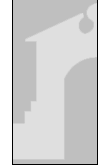|
|
| [ online
catalog | academics
| theoretical and applied science |
allied health technologies ] |
Catalog
2004-2005
Allied Health Technologies (BS)
School
of Theoretical and Applied Science
|
Requirements
of the Major
Career Paths |
Convener:
Edward Saiff
Advisor: Rena Bacon
(disclaimer below)
|
About the Major
This program is jointly offered by Ramapo College
of New Jersey and the University of Medicine and Dentistry of
New Jersey - School of Health Related Professions (UMDNJ-SHRP).
Our Allied Health Technologies major is designed for students
who would like to train in the fields of diagnostic medical
sonography, nuclear medicine technology, respiratory care or
vascular technology. These health care professionals will be
trained to work alongside physicians and other professionals
in the diagnosis and care of patients.
Students must complete 90 credits at Ramapo College, including
General Education requirements, School of Theoretical and Applied
Science requirements, and a preprofessional core. They then
undertake a professional program at UMDNJ-SHRP. The Allied Health
professional program consists of 3-4 academic semesters (up
to 18 months) of full time study in one of four areas of specialization.
Upon completion, students receive a joint B.S. Degree from UMDNJ
and Ramapo College, with a minor in Biology.
Concentrations in:
Diagnostic Medical Sonography
Sonographers are highly skilled professionals qualified by education
to provide patient services using diagnostic techniques under
the supervision of a licensed Doctor of Medicine or Osteopathy.
Diagnostic medical sonography includes general sonography, cardiac
sonography, vascular technology, and various subspecialties.
Respiratory Care
Respiratory therapists are health care specialists who participate
in the diagnosis, treatment, management, education, and preventive
care of patients with disorders of the cardiopulmonary system.
Some of their primary responsibilities include medical gas therapy,
humidification and aerosol therapy, drug administration, bronchial
hygiene therapy, cardiopulmonary resuscitation, maintenance
of artificial airways, and ventilator management.
Nuclear Medicine Technology
Nuclear Medicine is a medical specialty that uses radioactive
materials for the diagnosis and treatment of disease. They are
specifically trained in radiation safety, laboratory techniques,
imaging procedures, and the use of highly specialized equipment
to assure the efficient daily operation of their facility.
Vascular Technology
Vascular technologists use state-of-the-art ultrasound equipment
and other forms of non-invasive testing to detect the presence
of arterial diseases that can cause stroke, renal failure, gangrene,
amputation, and aortic aneurysms and of life-threatening venous
diseases that can lead to pulmonary embolism or morbid conditions
caused by blood clots, varicose veins, and non-healing ulcerations.
Application for this program is normally made at the end of
the sophomore year (generally by July 1). Applications received
beyond this deadline will be considered if enrollment capacity
in the major has not been reached. A minimum G.P.A. of 2.75
is required. |
|
Ramapo
College of New Jersey recognizes the value of
publishing on the Internet and encourages the
campus community to produce personal World Wide
Web pages to enhance communications. The College
does not preview, review, censor, or control the
content of these pages in any way as a matter
of course. Personal Web pages are those of the
authors, and do not in any way constitute official
Ramapo College of New Jersey content.
|
|
|
|
  |
|
